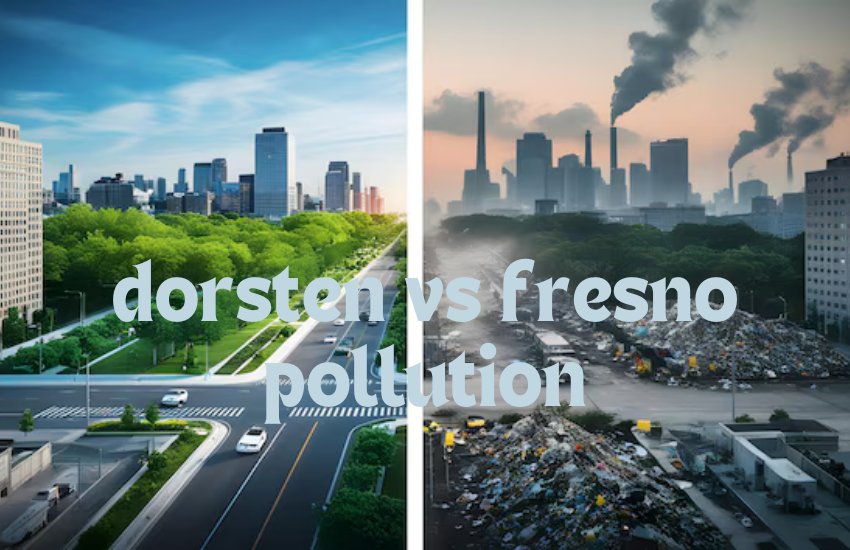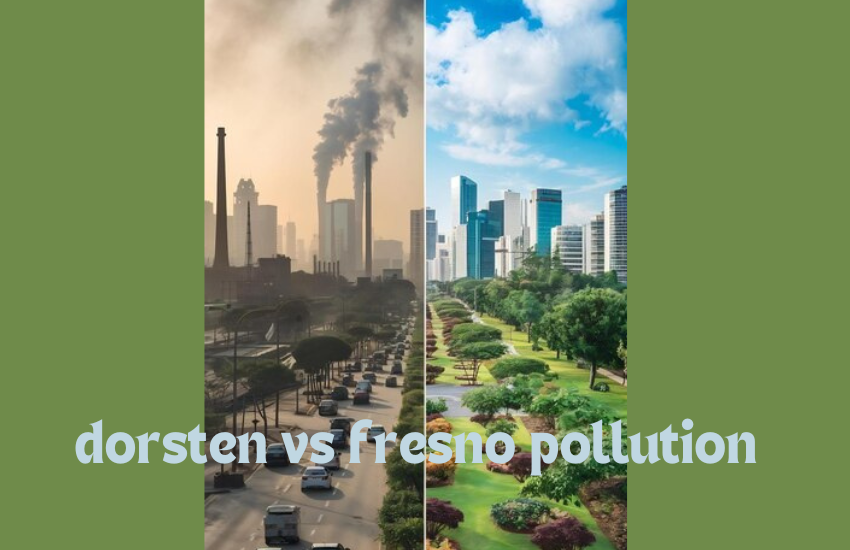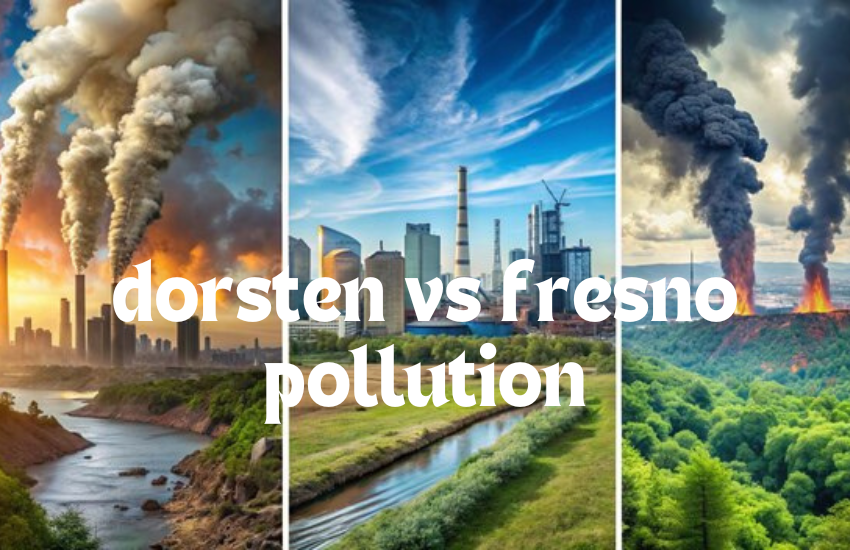Dorsten vs fresno pollution is a pressing global issue affecting numerous cities, including Dorsten in Germany and Fresno in the United States. Both cities face significant environmental challenges, but the nature and extent of these issues can vary widely. This article delves into the pollution problems in Dorsten and Fresno, comparing their sources, impacts, and the measures taken to mitigate them.
Geographic and Demographic Context
Location and Population of Dorsten
Dorsten vs fresno pollution is a city in North Rhine-Westphalia, Germany, with a population of around 75,000 residents. It is part of the Ruhr area, historically known for its industrial activities.
Location and Population of Fresno
Dorsten vs fresno pollution, located in the central part of California, USA, is the fifth-largest city in the state with a population exceeding 530,000. It lies within the San Joaquin Valley, an area known for its agricultural productivity.
Types of Pollution
Air Pollution
Air pollution involves the presence of harmful substances in the atmosphere, resulting from industrial emissions, vehicle exhausts, and other sources.
Water Pollution
Water pollution occurs when harmful chemicals, waste, or microorganisms contaminate water bodies, impacting aquatic life and human health.
Soil Pollution
Soil pollution is the contamination of soil with hazardous chemicals or waste, affecting agriculture and ecosystems.

Air Pollution in Dorsten
Major Sources of Air Pollution
In Dorsten, air pollution primarily stems from industrial activities, vehicular emissions, and residential heating. The city’s proximity to the industrial Ruhr area exacerbates these issues.
Air Quality Index (AQI) Trends
Dorsten has experienced fluctuations in its AQI, with occasional spikes due to industrial emissions and vehicular traffic. Efforts to monitor and control these emissions are ongoing.
Health Impacts of Air Pollution
Residents of Dorsten face health risks such as respiratory diseases, cardiovascular issues, and aggravated asthma due to prolonged exposure to poor air quality.
Air Pollution in Fresno
Major Sources of Air Pollution
Fresno’s air pollution is mainly due to vehicle emissions, agricultural activities, and industrial operations. The geography of the San Joaquin Valley traps pollutants, worsening air quality.
Air Quality Index (AQI) Trends
Fresno frequently records high AQI levels, often ranking among the worst in the United States. Seasonal variations, especially during the summer and winter, see significant deteriorations.
Health Impacts of Air Pollution
Air pollution in Fresno leads to a high prevalence of asthma, bronchitis, and other respiratory illnesses among its residents, particularly affecting children and the elderly.
Water Pollution in Dorsten
Major Sources of Water Pollution
Dorsten faces water pollution from industrial discharges, agricultural runoff, and untreated sewage. These pollutants affect local water bodies and groundwater.
Water Quality Data
Water quality monitoring in Dorsten reveals periodic contamination with nitrates, heavy metals, and organic pollutants, necessitating ongoing treatment and regulation.
Impact on Local Ecosystem and Health
Polluted water sources in Dorsten impact aquatic life and pose health risks to humans, including gastrointestinal diseases and other waterborne illnesses.
Water Pollution in Fresno
Major Sources of Water Pollution
In Fresno, water pollution is driven by agricultural runoff containing pesticides and fertilizers, as well as industrial waste and urban runoff.
Water Quality Data
Water quality in Fresno often shows elevated levels of nitrates, arsenic, and other contaminants, posing significant challenges for water treatment facilities.
Impact on Local Ecosystem and Health
Water pollution in Fresno affects the health of residents, particularly those relying on groundwater, and disrupts local ecosystems by harming aquatic species.
Soil Pollution in Dorsten
Major Sources of Soil Pollution
Soil pollution in Dorsten arises from industrial waste, improper disposal of chemicals, and agricultural activities involving pesticides and fertilizers.
Contamination Levels and Areas
Certain areas in Dorsten exhibit high levels of soil contamination, particularly near industrial sites and agricultural lands, affecting soil health and crop safety.
Effects on Agriculture and Health
Contaminated soil in Dorsten can lead to reduced agricultural productivity and pose health risks through the food chain, impacting both farmers and consumers.
Soil Pollution in Fresno
Major Sources of Soil Pollution
In Fresno, soil pollution is primarily due to intensive agricultural practices, industrial activities, and improper waste disposal.
Contamination Levels and Areas
Fresno’s soil often contains residues of pesticides, heavy metals, and other pollutants, especially in regions with intensive farming or industrial presence.
Effects on Agriculture and Health
Soil pollution in Fresno can result in decreased crop yields, contamination of food products, and health issues for farm workers and consumers.
Regulatory Framework and Policies
Environmental Regulations in Germany
Germany enforces strict environmental regulations through the Federal Environment Agency, focusing on reducing emissions, improving water quality, and managing waste.
Environmental Regulations in California
California is known for its stringent environmental policies, administered by agencies such as the California Environmental Protection Agency (CalEPA), which regulates air and water quality standards.
Pollution Control Measures in Dorsten
Government Initiatives
The government in Dorsten has implemented various initiatives to curb pollution, including emission controls for industries, promoting public transport, and enhancing waste management systems.
Community Efforts
Local communities in Dorsten actively participate in environmental conservation efforts, such as tree planting, recycling programs, and pollution awareness campaigns.
Technological Innovations
Dorsten employs technological solutions like advanced filtration systems, green energy projects, and smart grid technologies to reduce pollution and enhance sustainability.
Pollution Control Measures in Fresno
Government Initiatives
Fresno’s government has introduced measures like air quality monitoring, water treatment programs, and incentives for clean energy adoption to tackle pollution.
Community Efforts
Community organizations in Fresno engage in pollution control through initiatives like urban gardening, clean-up drives, and advocacy for stricter environmental regulations.
Technological Innovations
Fresno is adopting technologies such as precision agriculture, solar energy projects, and advanced water purification systems to address pollution challenges.
Comparison of Pollution Levels
Air Quality Comparison
Comparing the air quality of Dorsten and Fresno reveals that both cities face significant challenges, though Fresno’s AQI often indicates worse air quality due to its unique geographical and climatic conditions.
Water Quality Comparison
Water quality issues are prevalent in both cities, with agricultural and industrial activities being primary sources of contamination. However, Fresno’s reliance on groundwater exacerbates its water pollution problems.
Soil Quality Comparison
Soil pollution levels in Dorsten and Fresno are influenced by industrial and agricultural practices, with both cities working towards mitigating the impacts through regulation and innovation.

Public Health Implications
Respiratory Issues
Both Dorsten and Fresno residents suffer from respiratory problems due to air pollution, with children and the elderly being the most vulnerable.
Waterborne Diseases
Water pollution in both cities leads to health risks, including gastrointestinal diseases and other waterborne illnesses, affecting communities relying on contaminated water sources.
Soil Contamination Health Effects
Soil pollution poses health risks in both cities, impacting food safety and potentially leading to long-term health issues from exposure to contaminated soil and produce.
Future Outlook and Recommendations
Predictions for Dorsten
Dorsten’s future pollution levels depend on continued enforcement of regulations, technological advancements, and community engagement in environmental conservation.
Predictions for Fresno
Fresno’s pollution challenges will require sustained efforts in regulatory compliance, innovative solutions, and community initiatives to see significant improvements.
Strategies for Improvement
Both cities can benefit from sharing best practices, investing in green technologies, and fostering community awareness to combat pollution effectively.
Conclusion
Summary of Findings
Dorsten and Fresno both face significant pollution challenges, with unique sources and impacts due to their geographical and economic contexts. Efforts to mitigate these issues involve government regulations, technological innovations, and community participation.
Final Thoughts on Dorsten vs Fresno Pollution
While both cities have made strides in addressing pollution, ongoing commitment and cooperation are essential to achieving cleaner and healthier environments for their residents. The comparison underscores the need for tailored solutions and continuous improvement in environmental policies and practices.




